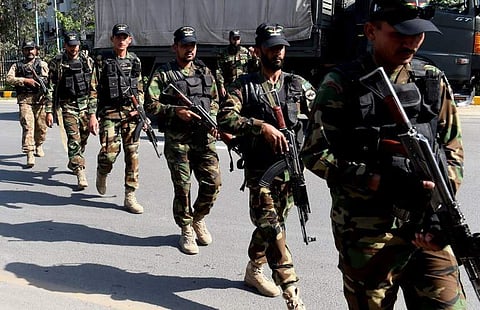

Pakistan's Supreme Court Wednesday allowed the trial of civilians by the military courts, conditionally suspending its October 23 ruling in which it had ordered authorities to conduct the hearing of the cases of ex-premier Imran Khan's supporters arrested for their alleged role in May 9 violence in ordinary courts.
A six-member Supreme Court bench, in a 5-1 majority order, announced its verdict on a set of intra-court appeals (ICAs) challenging its previous ruling.
Justice Musarrat Hilali, the only woman judge on the bench, dissented from it.
During the hearing, Attorney General Mansoor Awan urged the court to conditionally allow the military trials of civilian suspects to be resumed.
Accepting the plea, the court allowed the trials of civilians to continue.
However, the military courts would not issue a final verdict against the suspect.
It further stated that the final ruling would be conditional upon the Supreme Court's orders.
On October 23, a five-member SC bench had declared that trying civilians in military courts for their alleged role in attacks on army installations after the arrest of Khan on May 9 was ultra vires the Constitution.
The caretaker federal government as well as the provincial ones in Balochistan, Khyber Pakhtunkhwa and Punjab and the defence ministry had moved ICA before the SC against its judgment.
The verdict allows the military authorities to conduct the trial of over one hundred civilians who were handed over to the military authorities for their involvement in the attacks on the military installation on May 9.
The then Prime Minister Shehbaz Sharif-led cabinet had decided that the protesters who vandalised military installations on May 9 would be tried under the Army Act and Official Secrets Act.
According to the Pakistani Army, 102 accused have been handed over to the military authorities for trial.
They have been arrested for their alleged involvement in the attacks on key military establishments, including the General Headquarters in Rawalpindi, the Corps Commander's House in Lahore, Pakistan Air Force Base Mianwali, and an office of the Inter-Services Intelligence (ISI) in Faisalabad.
During the hearing, Awan urged the court to conditionally allow the military trials of civilian suspects to be resumed.
Announcing its verdict, the Supreme Court said that the trials of 103 civilians would continue.
Observing that the military courts would not issue a final verdict against the suspects, the SC said that the final ruling would be conditional upon the Supreme Court's orders.
Subsequently, the court issued notices to the respondents and adjourned the hearing until the third week of January.
Reacting to the order, the Lahore High Court Bar Association said it would hold a strike on Thursday and boycott court proceedings after the hearing of urgent cases in protest.
In a statement, it strongly condemned today's decision and voiced its objection to the formation of the bench, Dawn newspaper reported.
The bar said lawyers did not accept military courts under any circumstances as the Supreme Court has already declared them void of jurisdiction.